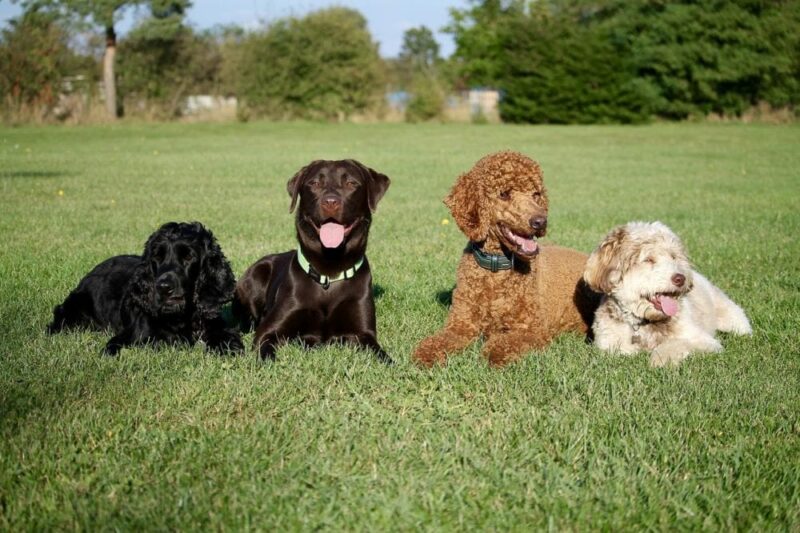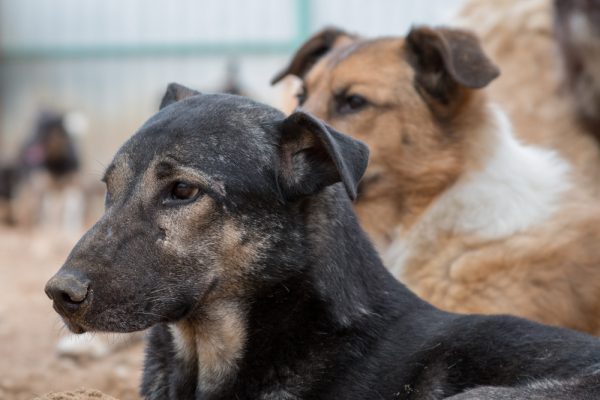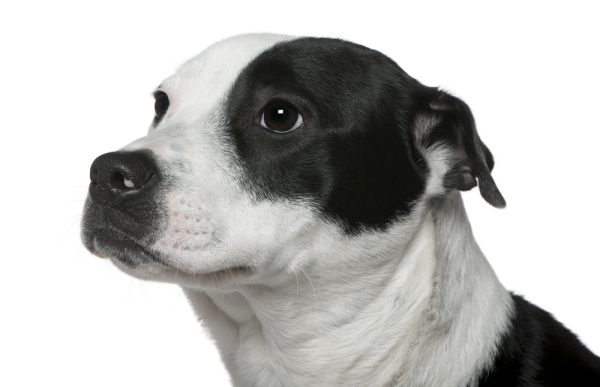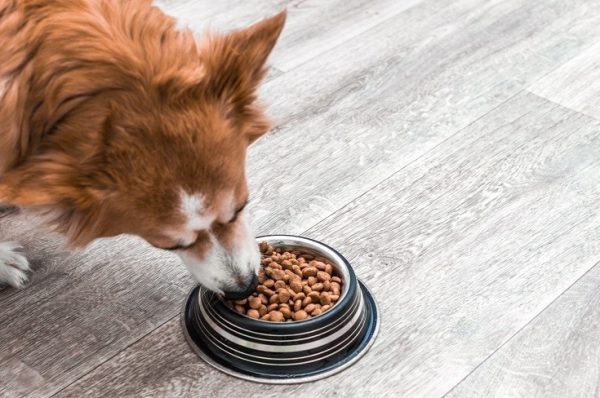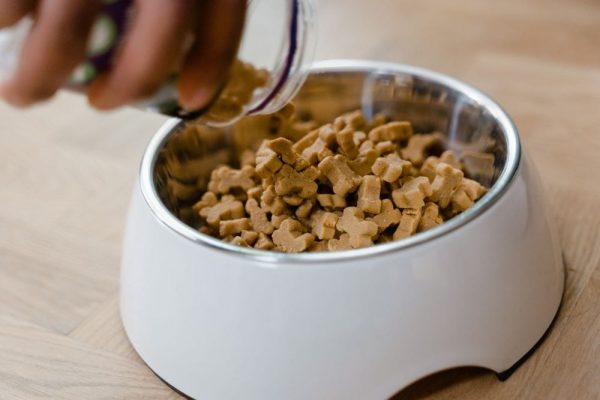While nearly every dog will deal with tummy trouble at least once in their lives, some seem especially unlucky when it comes to digestive issues. These 20 types of dog breeds are known to be prone to having sensitive stomachs, including belly problems that can turn into serious medical emergencies. If you own one of these breeds, you should educate yourself on the stomach issues that your dog could deal with in their life.

The 20 Dog Breeds Prone to Sensitive Stomachs
1. German Shepherds
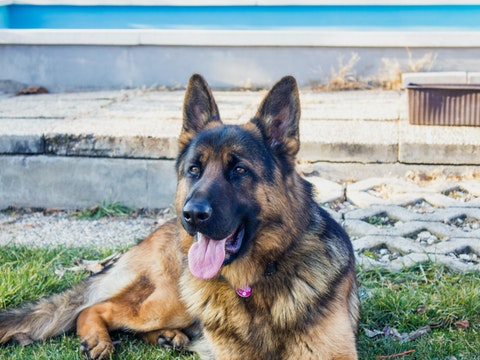
| AKC Class: | Herding |
| Height: | 22–26 inches |
| Weight: | 50–90 pounds |
The German Shepherd is probably the best-known police and military dog in the world. However, they are also prone to several different stomach issues. German Shepherds can suffer from food allergies and sensitivities, with signs that include vomiting and diarrhea. They are also prone to a condition called megaesophagus, where the esophagus expands abnormally and loses normal movement, causing food and water to become stuck on the way to the stomach. Regurgitation is one sign of this condition.
Eosinophilic gastroenteritis, the inflammation of the stomach and intestinal lining, is another cause of sensitive stomach in this breed. Finally, German Shepherds, like all deep-chested dogs, are prone to bloat, an emergency condition where the stomach flips and twists, trapping air and liquid.
2. Yorkshire Terriers

| AKC Class: | Toy |
| Height: | 7–8 inches |
| Weight: | 7 pounds |
Yorkshire Terriers, or Yorkies, are prone to sensitive stomachs caused by several medical conditions. Pancreatitis, or inflammation of the pancreas, is one such disease. Hemorrhagic gastroenteritis (HGE) is a serious stomach and intestinal condition most common in toy and small breeds like the Yorkie. It causes severe bloody diarrhea and vomiting and can lead to life-threatening dehydration. Yorkies may also suffer from chronic gastritis and long-term irritation of the stomach.
3. Shih Tzus

| AKC Class: | Toy |
| Height: | 9–10.5 inches |
| Weight: | 9–16 pounds |
Like Yorkies, Shih Tzus may suffer from chronic gastritis. Male Shih Tzus are also prone to a condition called antral pyloric hypertrophy. This disease impacts the muscles of the stomach, especially those that control the pylorus, or the opening from the stomach into the intestines. As a result of this disease, the Shih Tzu’s stomach contents are unable to flow normally into the intestines and can become backed up, causing vomiting and abdominal pain.
4. Great Danes

| AKC Class: | Working |
| Height: | 28–32 inches |
| Weight: | 110–175 pounds |
The Great Dane is one of the largest of all dogs, but that doesn’t spare them from sensitive stomachs. Like German Shepherds, Great Danes are prone to both megaesophagus and bloat. In fact, Great Danes are one of the breeds most at risk for bloating. Owners of this breed should take precautions to prevent bloat by not feeding their Danes large meals and avoiding exercise right after eating. Signs of bloat include dry heaving, stomach pain, enlarged abdomen, restlessness, panting, elevated heart rate, and collapse. A bloated Great Dane requires immediate medical attention.
5. Labrador Retrievers
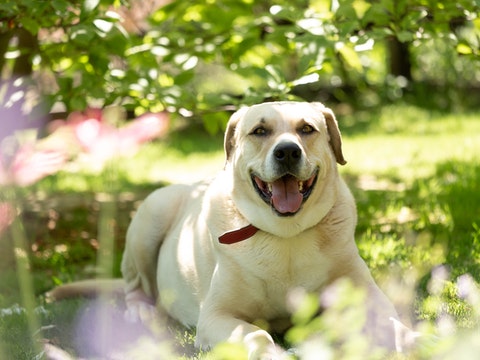
| AKC Class: | Sporting |
| Height: | 21.5–24.5 inches |
| Weight: | 55–80 pounds |
Long the most popular breed in the United States, Labs are prone to several causes of a sensitive stomach. Megaesophagus and bloat can both occur in Labradors. Food allergies are also common in the breed. Finally, Labradors are their own worst enemy when it comes to stomach health, well-known for eating things that they shouldn’t. These dietary indiscretions can lead to stomach upset or even a foreign object becoming lodged in the stomach or intestines, requiring a surgical procedure to remove it.
6. Scottish Terriers

| AKC Class: | Terrier |
| Height: | 10 inches |
| Weight: | 18–22 pounds |
The Scottish Terrier, or Scottie, is another breed prone to food allergies, a common cause of sensitive stomach, vomiting, and diarrhea. Dogs with food allergies may also have skin-related signs, including itching and hair loss. Typically, dogs develop a sensitivity to one or more of the ingredients in their dog food. Diagnosing and treating food allergies can be a time-consuming, frustrating process. Dogs with food allergies generally have to eat special hypoallergenic diets and are forbidden from having any other kind of food or treats.
7. Boxers

| AKC Class: | Working |
| Height: | 21.5–25 inches |
| Weight: | 50–80 pounds |
Boxers are prone to an inherited condition called pyloric stenosis, where the opening out of the stomach is abnormally narrow. This prevents food from flowing normally out into the intestines and can cause vomiting and weight loss. The breed is also prone to severe, ulcer-causing colitis, or inflammation of the colon, commonly called Boxer colitis. Like several other breeds on this list, Boxers can suffer from pancreatitis and bloat.
8. Irish Setters

| AKC Class: | Sporting |
| Height: | 25–27 inches |
| Weight: | 60–70 pounds |
The gorgeous Irish Setter is prone to an inherited condition called gluten-sensitive enteropathy (GSE). This immune-mediated condition causes the Irish Setter to be intolerant of gluten in their diet. Eating gluten or grains causes Irish Setters with this condition to suffer from diarrhea, skin problems, and weight loss. Because of their size and body shape, the breed is at risk of bloating and megaesophagus. Irish Setters with GSE may also be at an increased risk of developing inflammatory bowel disease (IBD).
9. Miniature Schnauzers

| AKC Class: | Terrier |
| Height: | 12–14 inches |
| Weight: | 11–20 pounds |
Miniature Schnauzers are prone to two conditions causing a sensitive stomach. Like Yorkies and many other small breeds, they are vulnerable to HGE. Miniature Schnauzers are also very prone to developing pancreatitis, often suffering from a chronic form of the disease. The breed can also inherit a condition called hyperlipidemia, or elevated fat levels in the blood. Fat can trigger the development of pancreatitis, so hyperlipidemia could explain Miniature Schnauzers’ tendency toward this condition.
10. Shar Pei

| AKC Class: | Non-sporting |
| Height: | 18–20 inches |
| Weight: | 45–60 pounds |
The Chinese Shar Pei is prone to numerous conditions that can cause stomach issues. Food allergies, eosinophilic gastroenteritis, IBD, and megaesophagus all occur in the breed. Although smaller than most breeds that suffer bloat, Shar Pei are also prone to this condition. Finally, Shar Pei can inherit a genetic defect that prevents the proper absorption of vitamin B12. Shar Pei with this condition suffer stunted growth, poor appetite, and decreased blood cell counts. Unfortunately, stomach and digestive issues are just a few of the many conditions this wrinkly breed can inherit.
11. Basenjis
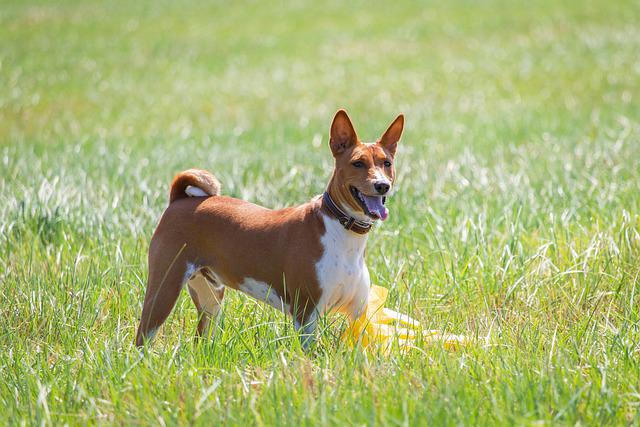
| AKC Class: | Hound |
| Height: | 16–17 inches |
| Weight: | 22–24 pounds |
Known as the “barkless dog,” the Basenji is a native African breed prone to hereditary causes of a sensitive stomach. They can inherit a severe form of IBD called immunoproliferative enteropathy, which causes severe issues with nutrient absorption from the intestines and protein loss. They can also suffer from a disease called exocrine pancreatic insufficiency, or lack of key digestive enzymes. Without these enzymes, Basenjis have trouble digesting their food, leading to improper nutrient absorption and some really smelly stool.
12. Soft-Coated Wheaten Terriers

| AKC Class: | Terrier |
| Height: | 17–19 inches |
| Weight: | 30–40 pounds |
Soft-Coated Wheaten Terriers are among the breeds commonly afflicted with IBD, which often leads to protein-losing inflammation in their intestines. These conditions can both cause sensitive stomachs and often require special diets and medications to manage. They are typically diagnosed with specialized blood tests. Wheaten Terriers that manage to escape these conditions are still prone to diarrhea and chronic vomiting. Allergies, including food allergies, can also be a concern for this breed.
13. Lhasa Apsos

| AKC Class: | Non-sporting |
| Height: | 10–11 inches |
| Weight: | 12–18 pounds |
Long-haired Lhasa Apsos are prone to sensitive stomachs from several causes, including chronic gastritis, colitis, IBD, and pyloric stenosis. Like other small breeds, they are prone to pancreatitis and HGE. Any of these conditions may cause long-term stomach sensitivity and signs like vomiting, diarrhea, and appetite fluctuations. With this breed also prone to several other hereditary conditions, it’s important to choose your breeder carefully before purchasing a Lhasa Apso puppy.
14. Poodles
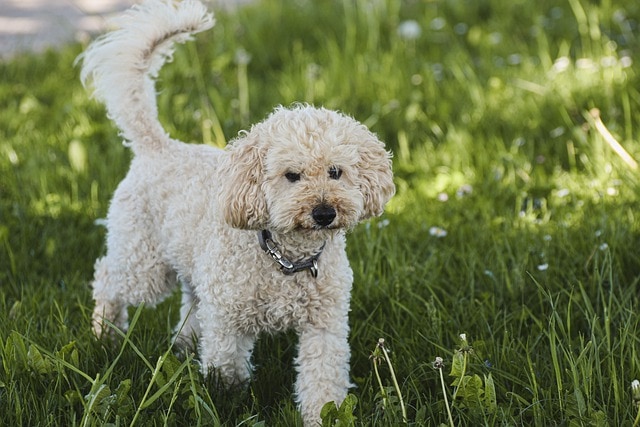
| AKC Class: | Non-sporting, toy |
| Height: | >10 inches–15+ inches |
| Weight: | 4–70 pounds |
Poodles come in three different sizes—Toy, Miniature, and Standard—all of which are prone to sensitive stomachs. Toy and Miniature Poodles are prone to HGE and chronic gastritis like several other breeds on this list. All types of Poodles can suffer from IBD, which can cause stomach cramps, diarrhea, or constipation. Standard Poodles are among the deep-chested breeds at elevated risk for bloat, though it is less common in them than in other large breeds. Make things easy on a Poodle’s stomach by avoiding unnecessary diet changes and following the recommendations to avoid bloat.
15. Golden Retrievers
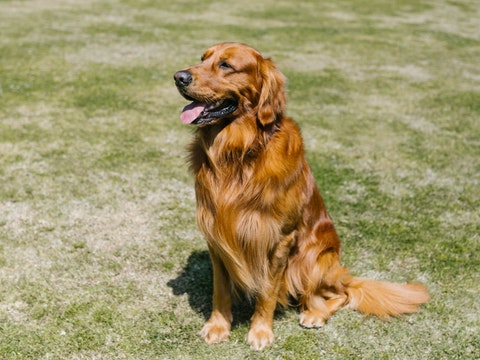
| AKC Class: | Sporting |
| Height: | 21.5–24 inches |
| Weight: | 55–75 pounds |
Happy-go-lucky Golden Retrievers don’t always have the happiest stomachs. Like Labs, they often eat first and ask questions later, leading to foreign bodies or vomiting from dietary indiscretions. The breed is also prone to food allergies and like all deep-chested dogs, bloat. Cancer is an unfortunately common condition in Golden Retrievers. Some types of cancer, such as gastrointestinal lymphoma, can cause stomach issues as part of their initial presentation of clinical signs.
16. Collies
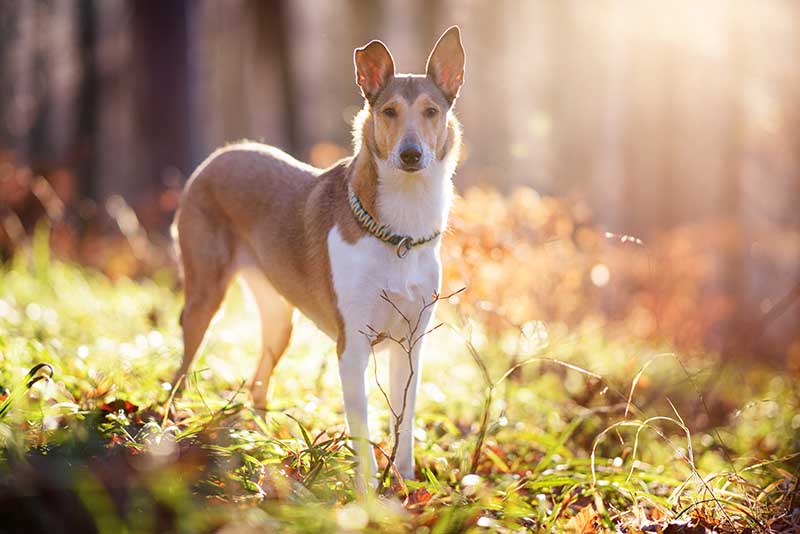
| AKC Class: | Herding |
| Height: | 22–26 inches |
| Weight: | 50–75 pounds |
The luxurious-coated Collie may be best known as the breed of Lassie, the TV and movie star dog. The breed is also at known risk of bloat, given their deep-chested build, which may be less obvious given their overwhelming fur coat. Collies are also prone to exocrine pancreatic insufficiency, which causes stomach issues, smelly stool, and trouble digesting food. This condition usually requires lifelong supplementation of the missing digestive enzymes.
17. Weimaraners

| AKC Class: | Sporting |
| Height: | 23–27 inches |
| Weight: | 55–90 pounds |
These silver German hunting dogs are prone to several inherited health conditions, none of which usually cause stomach issues. However, the breed can suffer from allergies, including food allergies. As a deep-chested dog breed, Weimaraners are also at high risk for bloat. Potential Weimaraner owners should choose a breeder who performs all recommended health checks on their breeding stock before agreeing to purchase a puppy. They should also become familiar with the signs of bloat as a precaution.
18. Akitas

| AKC Class: | Working |
| Height: | 24–28 inches |
| Weight: | 70–130 pounds |
This ancient Japanese breed is a huge, loyal, and protective dog that may fall victim to a sensitive stomach. Allergies and cancer are both found in the Akita. A common Akita cancer, lymphoma often impacts the stomach and intestinal tract. Akitas are not as vulnerable to bloat as some other large dogs, but it can still occur in the breed. Akita owners should follow the recommendations for preventing bloat, including avoiding overfeeding.
19. Doberman Pinschers
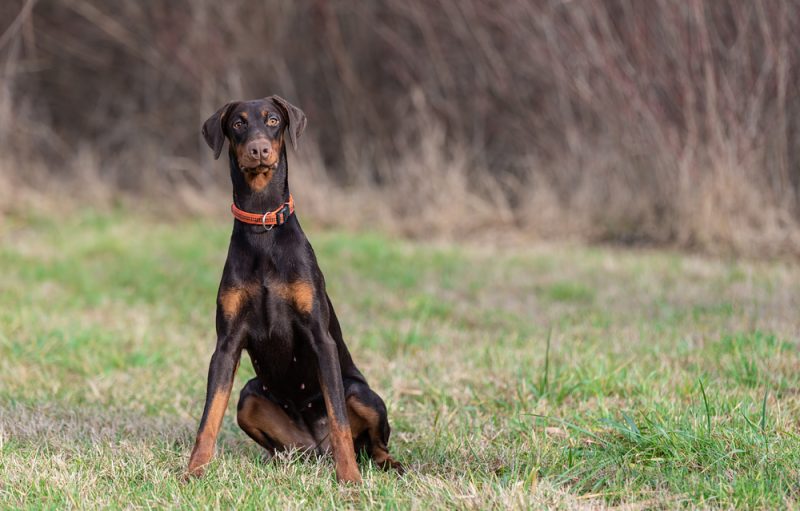
| AKC Class: | Working |
| Height: | 24–28 inches |
| Weight: | 60–100 pounds |
The loyal, protective, and intelligent Doberman Pinscher can look extremely intimidating. Unfortunately, this powerful breed can easily be taken out by the medical emergency that is bloat. Cancer also occurs in this breed, which can cause stomach issues. One point to keep in mind with Dobermans is that they are also prone to other conditions, such as diabetes, kidney disease, and liver disease, all of which may present with signs including vomiting and appetite loss. These can be mistaken for signs of a sensitive stomach when they actually indicate something else entirely.
20. Basset Hounds
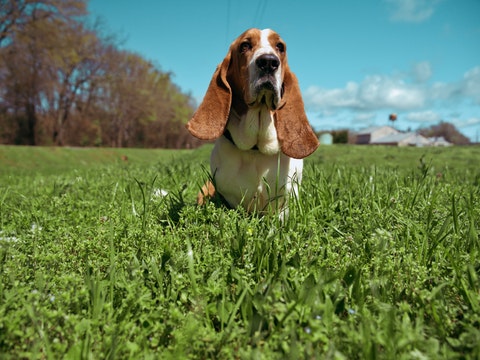
| AKC Class: | Hound |
| Height: | Up to 15 inches |
| Weight: | 40–65 pounds |
You might have to get really low to the ground to see it, but the Basset Hound is actually a very deep-chested breed. Because of this, they’re probably the shortest dogs that are still prone to bloat. With a stomach sensitive to twisting, Bassett owners need to take precautions against bloat. This breed also often commonly suffers from food sensitivities and food allergies, both of which can cause a sensitive stomach.

Conclusion
As we’ve learned, a sensitive stomach in a dog can have many different causes. These 20 breeds may be the most prone to tummy trouble, but any dog could show signs related to a sensitive stomach. If you own a breed prone to bloat, make sure you’re prepared to act quickly if you notice the signs of this emergency.
Common signs of a sensitive stomach, such as vomiting and diarrhea, can indicate other health conditions. If you notice that your pup seems to have a reactive digestive system, make sure you see your vet and rule out other possible causes before you chalk the trouble up to a sensitive stomach.
See Also:
Featured Image Credit: Katrinbechtel, Pixabay
